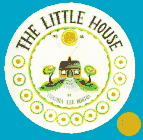 I just read Virginia Lee Burton's classic, The Little House, to the kid for the first time, and it shocked me. Written in 1942, The Little House is a Caldecott Medal winner that probably every person born in the US has read (or has had read to them).
I just read Virginia Lee Burton's classic, The Little House, to the kid for the first time, and it shocked me. Written in 1942, The Little House is a Caldecott Medal winner that probably every person born in the US has read (or has had read to them).
It tells the story of a stout little brick farmhouse which becomes overwhelmed and neglected as the great big city--New York, from the look of it--grows up around it. All ends well, though, when someone rescues the house from the shadows of its new skyscraper neighbors and carts it off to a new rural hilltop, one with a distant skyline view.
The city's takeover of the rural landscape is portrayed darkly, but it's also the inevitable march of Progress. Good old fashioned American Dream kind of stuff, tracing the country's technological evolution from horses and buggies to elevated trains. It might have been the story of The Little House on 74th and Third, but not much else.
Was 1942 too early for Burton to recognize that the Little House wouldn't be swamped by city sprawl, but by the suburbs? The Little House is blissfully free of highways and strip malls and tract homes. It didn't survive as the last old house on an 8-lane commercial by-pass, with a neon sign offering Psychic Readings from a tacked on storefront window.
Am I just being a paranoid, P.C., anti-suburban snob? [Wait, don't answer that.] But even the Amazon reviewer says, "Young readers are more likely to be drawn in by the whimsical, detailed drawings and the happy ending than by anything Burton might have been implying about the troubling effects of urbanization."
Somehow when a book's a "classic," people can remain oblivious to its "real" story for a long time. To people sensitive to architecture, urban planning, land use, or historical preservation, The Little House reads like Little Black Sambo.
What, you're gonna buy The Little House in hardcover for $10.17 from Amazon after THAT? How about Mike Mulligan and His Steam Shovel instead?

I've been thinking about this post since you put it up greg... the day my parents told some of their neighbors (they live in Dorval, a suburb of Montreal) that we were going to have a kid the immediate question was "so they are moving near here right?" Lots of people can no longer conceive that you want to live in town, that you don't want a car and that you like (OMG) walking places. Sure living urban isn't always fun (walking down the park for used needles is the suck) but (no offense to those who live out here and love it) I would pretty much rather be hung by my toes and beaten like a piŅata than live in the suburbs again. (wow that is a lot of parenthetical thought)